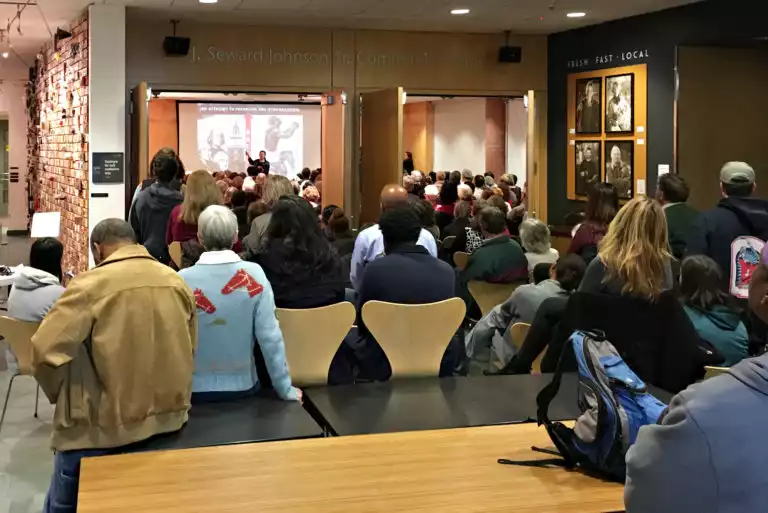
I could continue to listen to Ruha Benjamin speak about race for at least five more Tuesday evenings. Having reached the end of the Racial Literacy series co-sponsored by the library, Not In Our Town Princeton and the Princeton Garden Theatre, I think I have a deeper understanding of issues surrounding race and white privilege, issues I thought I had a firm grasp on when the series began on Oct. 18.
Part of this is the powerful message of how we got into this quagmire of race. In addition to imparting knowledge and adding context to historical and contemporary events in a thoroughly engaging manner, Ms. Benjamin ends each session by challenging each of us to change the way we interact with each other — to look for ways to close what she calls the “respect gap.” This gap, the residue of the acceptance of centuries-old false assumptions based wholly on appearance and backed by pseudoscience, affects how we approach each other, how we speak with each other and how we view each other’s place in society.
Closing the respect gap at this individual level is a necessary element to undoing the entrenched institutional racism that prevents us from achieving the promise of our nation. As we learned in the first half of this series, top-down laws and directives have had only limited effectiveness in addressing bedrock inequity; electing a black president hasn’t ended racism.
At the end of the Nov. 1 lecture, one participant spoke of the need on a daily basis to challenge her assumptions about the people she meets and how she interacts with them. This fundamental change in attitude, if utilized by enough of us, regardless of how we’ve been sorted by the illusion of race or class — for the record, I’m a white Irish-American male of the Baby Boom generation raised in the working class — has the potential to close the respect gap and chip away at racism.
Thanks to the partnership with NIOT Princeton and the Garden Theatre, I will have another opportunity to listen to Ms. Benjamin. To the delight of all present on Nov. 1, Ms. Benjamin announced that a sixth part of the series has been added on Nov. 29. This session is intended for those who attended one or more of the previous sessions.
Judging by the overflow crowds at these programs, racism is clearly a topic Princeton wants to learn more about. Our friends from Not In Our Town Princeton are here on the first Monday of each month for just that purpose, with their series Continuing Conversations on Race and White Privilege. Please join them in the Community Room.
The Racial Literacy series was presented with support from the National Endowment for the Humanities: Any views, findings, conclusions or recommendations expressed in this programming do not necessarily represent those of the National Endowment for the Humanities.
Photo courtesy of the author.
